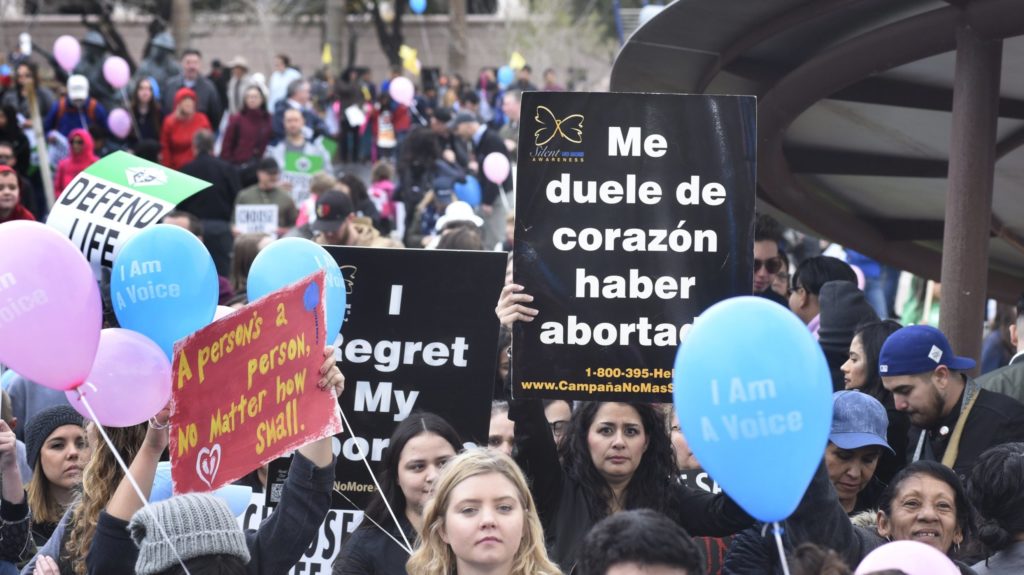The Arizona Supreme Court ruled April 9 that a 160-year-old near-total abortion ban still on the books in the state is enforceable, a move that could shutter abortion clinics in the state. But, Arizona may have the issue of abortion on its ballot in November, which could undo those restrictions.
The state's highest court said that following the recent reversal of the 1973 Roe v. Wade decision, there was no federal or state law preventing Arizona from enforcing a 19th-century abortion ban -- with an exception for the life of a mother -- that had become dormant following Roe.
In a 4-2 decision, the state Supreme Court said the 1864 law, which predated Arizona's statehood, is "enforceable;" however, the court also paused the ruling in order to send the case back to a lower court to hear additional arguments.
The ruling, in effect, overturns a lower court's ruling that found a 15-week ban from 2022 superseded the 1864 law.
But the state Supreme Court found the 15-week ban "does not create a right to, or otherwise provide independent statutory authority for, an abortion that repeals or restricts" the previous ban, "but rather is predicated entirely on the existence of a federal constitutional right to an abortion since disclaimed" following the U.S. Supreme Court's Dobbs v. Jackson Women's Health Organization decision that overturned Roe and its related abortion precedent.
In a statement, Alliance Defending Freedom senior counsel Jake Warner, who argued before the court, said, "Life is a human right, and today's decision allows the state to respect that right and fully protect life again -- just as the legislature intended."
"Life begins at conception. At just six weeks, unborn babies' hearts begin to beat," Warner added. "At eight weeks, they have fingers and toes. And at 10 weeks, their unique fingerprints begin to form. Arizona's pro-life law has protected unborn children for over 100 years, and the people of Arizona, through their elected representatives, have repeatedly affirmed that law, including as recently as 2022. We celebrate the Arizona Supreme Court's decision that allows the state's pro-life law to again protect the lives of countless, innocent unborn children."
Arizona Attorney General Kris Mayes, a Democrat, called the ruling "unconscionable and an affront to freedom."
"Make no mistake, by effectively striking down a law passed this century and replacing it with one from 160 years ago, the Court has risked the health and lives of Arizonans," she said in a statement. "The Arizona Court of Appeals decision, which the Supreme Court has struck down today, was well reasoned and aligned with how courts harmonize different legislation.
"Today's decision to reimpose a law from a time when Arizona wasn't a state, the Civil War was raging, and women couldn't even vote will go down in history as a stain on our state," she continued. "This is far from the end of the debate on reproductive freedom, and I look forward to the people of Arizona having their say in the matter. And let me be completely clear, as long as I am Attorney General, no woman or doctor will be prosecuted under this draconian law in this state."
Earlier in April, a coalition called Arizona for Abortion Access, which includes organizations such as the ACLU of Arizona and Planned Parenthood Advocates of Arizona, said it had gathered enough signatures to qualify for a ballot measure to enshrine abortion access in the state constitution, well before the July 3 deadline to submit the signatures to Arizona's secretary of state.
The Arizona Catholic Conference has urged Catholics and other citizens of Arizona not to sign that petition.
In an April 10 statement released by the state conference, Arizona's Catholic bishops called the ballot measure an "extreme initiative" and not what "Arizona wants or needs, and we continue to pray that it does not succeed."
The bishops acknowledged that the Arizona Supreme Court's opinion a day earlier "is currently the law of the land" but they expressed grave concerns about the "far-reaching pro-abortion initiative" for the November ballot "that, if approved by voters, will ultimately dictate Arizona law in this regard."
"This initiative, among other things, would likely remove most safeguards for girls and women that are currently in place at abortion clinics, permit a minor to obtain an abortion without parental involvement or permission, and allow for painful late-term abortions of viable preborn children," they said, adding that they "will always stand ready to continue to serve the most vulnerable in our communities, especially preborn children and their mothers."
Signing the statement were Bishops John P. Dolan of Phoenix, Edward J. Weisenburger of Tucson and James S. Wall of Gallup, New Mexico, whose diocese includes part of Arizona; and Auxiliary Bishop Eduardo Nevares of Phoenix.
The Catholic Church teaches that all human life is sacred and must be respected from conception to natural death and, as such, opposes direct abortion as an act of violence that takes the life of the unborn child. After the Dobbs ruling, the U.S. bishops have reiterated the church's commitment to serving both women and unborn children.

